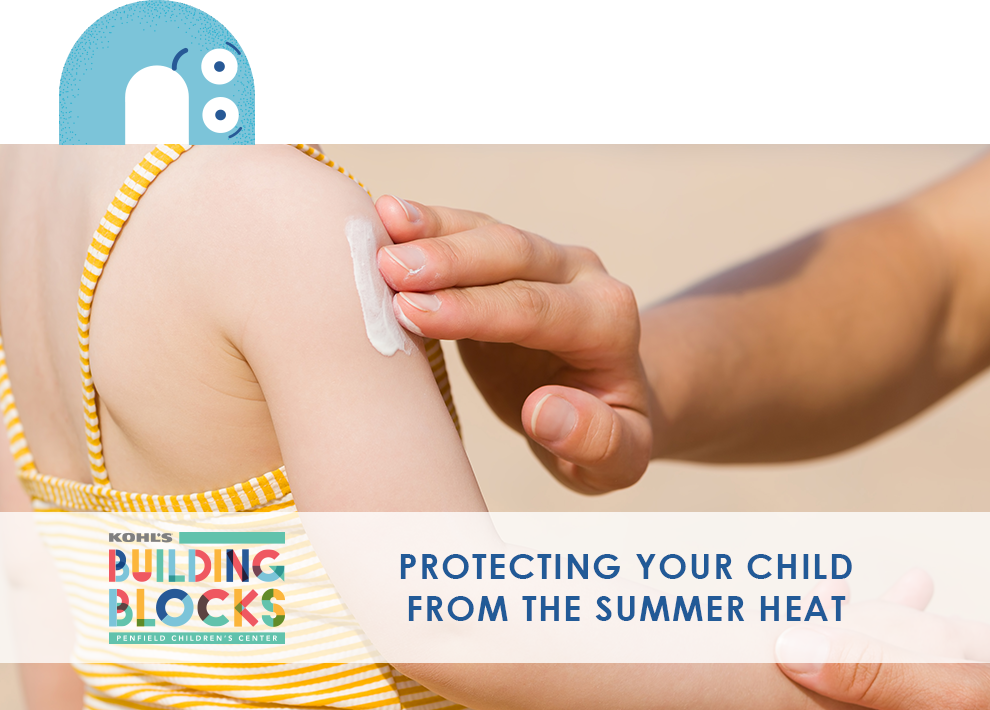
By: Lainie Harris, Penfield Children’s Center
As summer kicks off, there are seemingly endless outdoor activities to fill the days. While spending time at the beach, in parks, and at various festivals or farmer’s markets, it is very important to be mindful of the heat and sun exposure that your child gets.
According to experts at the American Academy of Pediatrics (AAP), there is no specific temperature that’s too high for a baby to go outdoors. While there’s no official time limit for young children to be in intense heat, it is important to learn some tips and tricks on how to keep your child safe and comfortable during the summer months.
- Limit sun exposure between the hours of 10 a.m. and 4 p.m., when the sun is strongest.
- Look for shade when spending time outdoors
- Use extra caution in temperatures above 90 degrees
- Avoid overdressing your baby
- Use chemical-free sunscreen, avoiding your baby’s eyes
- The sun can still be harmful on overcast days
Another important thing to remember is that infants are less able to sweat that older children and adults. This means that their bodies have a harder time cooling themselves down. In addition, it can take up to 14 days for babies to acclimate to hotter temperatures. When using a stroller, choose one with a large canopy or overhead piece to block as much sun as possible from your baby’s skin.
Consider having your child wear a brimmed hat; this can be especially helpful if your child has little or no hair. It can take just 15 minutes for unprotected skin to burn in the sun! Using SPF 30 or above, make sure your child’s skin is protected from the hot summer sun. Sunscreen should be reapplied at least every two hours.
Warning signs that your child is overheating
- Warm to the touch (more than usual)
- Extreme thirst
- Sweating profusely
- Acting tired or weak
- Lack of energy
Making sure your child is hydrated is extremely important. Carry a water bottle with you when spending time outdoors, both for your sake and your child’s. Infants under 12 months should not drink water due to the risk for water intoxication, but should regularly drink breast milk or formula to stay hydrated.
Warning signs that your baby is dehydrated
- A mouth that appears dry
- Few tears when crying
- Lack of energy and/or playfulness
- Fewer wet diapers than normal
If you think your child is overheating or dehydrated, you should immediately take them to a cooler environment. If the situation seems extreme, you may need to undress them and sponge their body down with cool water. Give your child sips of water or breast milk/formula. If the situation does not resolve, call your pediatrician.
Remember to never leave a child in a car, no matter how short of a time it may seem. In moderate sun, a car can become like an oven, rising 20 degrees or more in just 10 minutes — extremely dangerous for children, whose body temperatures rise up to five times faster than adults’. In just 60 degree weather, a car can heat up to over 110 degrees. Over 30 percent of deaths from overheating in a car since 1998 have involved children younger than 1 year old; in 2013 alone, 44 American children died of heatstroke after being left in cars.
Last but not least, follow your instincts. If you are too hot or uncomfortable in the heat, so is your child.
What are some creative ways for your child to stay safe while enjoying the outdoors this summer?
References
http://www.webmd.com/first-aid/dehydration-in-children-treatment


Leave a Reply